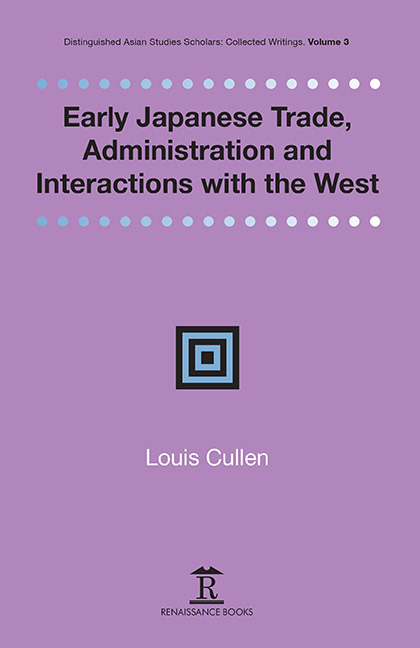Introduction: The Route to Japanese Trade
Published online by Cambridge University Press: 30 April 2022
Summary
LANGUAGES AND JAPAN
I had never envisaged Japan as a part of my future academic life. In a teaching career spanning forty years (1963–2003), Japan featured actively only in the eighteen years from 1985. It had then to be combined with teaching in Irish history and longstanding research in French history, inevitably resulting in a drastic curtailment of plans for an exhaustive study of the Irish merchant communities in France.
My first contacts with Japan date from 1972, when Matsuo Tarō, a lecturer at Hosei, took two years’ leave of absence in Ireland to benefit from supervision and to attend undergraduate lectures. Turned down by University College Dublin (which he regarded as the preeminent national university and hence his first choice) on the grounds that his English was inadequate, I met him by appointment. While he had difficulties in spoken English, he read it with ease and had a very coherent plan for his research in rural history. He was subsequently admitted to TCD (Trinity College Dublin), and thus began a lifelong friendship. Between 1979 and 1992 he visited Ireland on four further occasions, for sixteen months in all, and was due to return for a full year in 1997 when he was struck down by a fatal illness. His long first stay fitted into the emerging pattern of Japanese academic visits to Europe. From the early 1980s Japanese scholars sought the status of ‘visiting academic’ at Trinity, and from the mid-1980s research students became commonplace.
Invited to Japan by Professor Matsuo in 1985 for a month-long stay to give a series of four lectures in Irish history at Japanese universities, I started to study Japanese in advance. This urge was prompted less by the invitation itself than by an active interest in languages, and by this unexpected opportunity to study an oriental language. Years before, in wartime isolation in a neutral country, old textbooks in French and German had served as an avenue to the outside world and fired my imagination. I even wrote to the largest bookseller in Dublin for grammars in both languages. With books of any sort from Britain in short supply, the only book on offer was Hugo's Dutch in Three Months Without a Master. At eleven or twelve years of age I duly mastered it.
- Type
- Chapter
- Information
- Publisher: Amsterdam University PressPrint publication year: 2020



